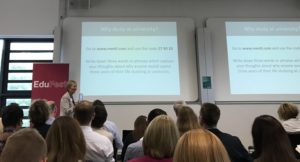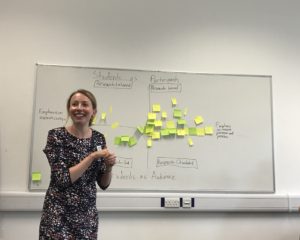Last Thursday academics and learning and teaching partners across the University gathered for EduFest 2018. A new one-day event aimed at encouraging colleagues to reflect on key themes in their own teaching, including: learning assessment, inclusion, sustainability and research led engagement. This event is particularly timely for Bath with the University’s curriculum transformation project on the horizon. Curriculum transformation offers colleagues, including myself, an opportunity to promote greater engagement, real-life application and inclusion in our teaching.
The event featured an impressive line-up of external speakers, included keynote speaker Professor Tansy Jessop – a champion for transformation of student learning through exciting and rewarding assessment. Professor Jessop’s talk urged us to move away from methods of teaching and assessment that “alienate” students, highlighting several pathways that can lead to repetition and disengagement with learning. Course modules with no connection to the overall programme, risk-aversive metrics (e.g. traditional assessments) and mass education, where students do not feel “known” by their peers or teachers, were highlighted as concerns. Professor Jessop also indicated that “just giving knowledge” does not allow students to develop their own perspective, emphasising the need to develop students’ intellectual pathway from “black and white” thinking to “critical, complicated and messy” problem solving. It was also acknowledged that it is important that we let our students know that it is OK to be confused, and to feel the learning experience is “challenging everything they know”, assuring them that they will come out the other side!

Professor Tansy Jessop’s Talk on "Increasing engagement to transform student learning"
Professor Jessop also spoke on how research builds engagement by stimulating intellectual curiosity, encouraging students to make decisions and choices and to build ownership and partnership. We should be looking forward to engaging students in “enquiry-based learning”, rather than presenting facts and assessing regurgitation. Evidence has shown that students who actively read and more importantly write about research experience significantly greater learning gains.
During the day I also attended a number of parallel sessions, including panel discussions, workshops and masterclasses. The panel session on Curriculum Transformation, with Dr Barrie Cooper, Dr Beverley Gibbs and Dr Alex Sanden focused on learning from other academics who have experience of curriculum redesign at their own institutions, in this case: University of Exeter, University of Sheffield and UCL respectively. One of the key messages of this session was the view that curriculum transformation is an opportunity to take a more “Programme level view” of a course rather than viewing modules or units in isolation. This approach challenges a reoccurring problem in higher education of over assessment, where multiple assessments are required to “test” the specific content of a single module. Curriculum transformation therefore offers the opportunity to assess themes across a programme. The panel discussion emphasised that asking questions such as “What do you want your students to be able to do at the end of the programme?” and “Where will your students be employed?” are at the heart of successful curriculum transformation. A final important take home message from the discussion highlighted that as academics we should be asking ourselves what it means to deliver research led teaching. It was suggested that research-led teaching should focus on a set of core values for students and staff, where students are part of the research culture of a department and University.
With my interest in research led teaching sufficiently boosted I opted to attend the afternoon masterclass on “Unlocking research-engaged teaching” led by Dr Alex Standen and PhD student Joe Thorogood from UCL. Evidence has shown that students learn more effectively through active and enquiry-based learning and the masterclass focused on how academics can use their research to enhance learning, increase student partnership, and build a research community. We started the session with an exercise to assess where in our current teaching we emphasise research content, process and problem-solving with students. As you can see from the picture below, academics at Bath reported engaging students with research as an audience and as participants in research. However, could we be doing more to ensure students are active participants in our research and at the wider departmental and University level?

Dr Standen next to our mapping of University of Bath research led teaching
Dr Standen outlined the connected curriculum framework proposed in UCLs Education Strategy 2016 to “integrate research into every stage of a degree”. The connected curriculum framework by Dilly Fung – Director of the Centre for the Advancement of Learning and Teaching, is a set of core principles and dimensions that demonstrates how a curriculum can actively engage students in research and enquiry in multiple ways. Dimensions include “student making connections across subjects and out of the world” and “student learns to produce outputs – assessments directed at an audience”. I will be certainly going back to my own teaching, using the connected curriculum framework to ask how can I achieve these dimensions across the courses I teach on.
The final session I attended was a masterclass on “Strategies for enhancing assessment” led once again by Professor Tansy Jessop. This session began again with emphasis on connected curriculum and a recognition that we do not need to assess every individual unit or module. Professor Jessop went on to outline the “TESTA” rational for assessment or “Transforming the Experience of Students through Assessment”. TESTA is a national teaching fellowship project across four institutions aimed at transforming student experience through assessment. We were presented with case studies of programme-wide changes in assessment, including an institution which increased the amount of formative assessment, whilst having fewer summative assessments. A greater number of formative assessments gave students a safe space to make mistakes and to learn from them. We also learnt about “silent seminars” where students may bring a set of sources to class e.g. journal articles, book chapters, media articles etc. and use the time to write or blog to “get to grips” with readings. I was particularly interested to hear about “two stage exams” where students are asked to prepare for a traditional 30 minute in-class exam. After completing the exam, students then repeated the exam but as a group of four, learning from each other. Students are not told about the second exam before the session. This seems like an excellent way to show students how collaboration is a better problem-solving strategy than competition.
Professor Jessop also spoke about the role and nature of assessment and feedback, suggesting we should view assessment as a “gift” and appreciate the hard work students have put into their work. Similarly, feedback can also be a gift, where students respond well to personalised feedback. One technique outlined to ensure students read and respond to feedback is to ask students to submit a reflection at the beginning of their assessment to explain how they have addressed the feedback from the previous assessment. Importantly Professor Jessop suggested that “feedback is a dialogue not a teaching telling a student what to do”.
In summary EduFest 2018 was a great opportunity to bring together academics from across the University and to hear from external speakers who have expertise and first-hand experience of curriculum transformation, connected curriculum, and innovative assessment. I look forward to sharing ideas from the day with colleagues and putting them into practice in my own teaching. Bring on EduFest 2019!
Respond